Speak to an Expert
admin@eumediation.net
Posted on: May 20th, 2024

Eurovision took place last week, and isn’t it great fun: the outfits, the staging, the lyrics, and well, the song titles: 'Rim Tim Tagi Dim', anyone?
Most years, it is a gloriously camp celebration of how music and dance can bring people together. This year, however, we had an extra element. Global conflicts, and more importantly the positions that people took up in respect of those conflicts, affected the atmosphere, arguably influenced the outcome, and even put people’s personal safety at risk. There were boos, boycotts, threats, acts being absent from rehearsals and even the final broadcast, and overall, a certain tension that was unusual for this typically kitsch affair.
The juries, the voting public, and some acts and their entourages were taking up positions based not just on other performers’ nationalities, but on their countries’ and governments’ decisions around who should be participating in the contest. Some jury members were declining to vote because they felt they could not be impartial, while others’ votes were arguably influenced more by the political milieu than by musical merit or entertainment value.
Interestingly, before the Eurovision broadcast, juries were told that “You must not favour or discriminate against any participant based on nationality, gender, suitability, political views, or any reason other than the song and performance. Do not let political views affect how you evaluate a song and/or an artist,”(1) It was hard to believe that all jury members (those who stayed, at least) were abiding by this.
Partisanship is a key element in the prolongation of conflict. In workplaces all around Europe and beyond, in our 25 years’ work in resolving interpersonal conflict, we find that interpersonal disputes have only become quite so entrenched because of people taking sides. Workers of all grades and levels of seniority can fall out at work, and most disputes are quickly resolved through good dialogue and collaboration. When a dispute goes beyond this, however, we will often get friends, colleagues, management, and others deciding who they think is right and who is wrong. They choose their champion, and having done so, they see everything that the other party does or says as being ‘wrong: ‘they shouldn’t be doing/saying that’, or typical: ‘See! That’s exactly what they’re like!’ And as soon as these observers to a conflict have taken up such positions, just like with Eurovision, their partisanship becomes impossible to shift. Moreover, the adherents and supporters of one ‘side’ become hostile to all the adherents and supporters of the other ‘side’: stifling dialogue and often wasting the employing organisation’s time, effort, and money.
If a mediator is brought in, one key strand in their successful intervention is their ability to remain impartial. Despite each sides’ efforts to ‘hook’ the mediator, and to have him or her see the dispute their way and their way alone, the mediator remains equally invested in each side’s interests: empathising with each person’s underlying needs and imperatives, while all the time never agreeing with either individual’s polarised view of the history of the dispute, their version of where the fault lies, or ultimately their claim to have occupied the moral high ground.
In all of our work in resolving workplace conflict, especially in multinationals all around Europe, we can safely say that not only have the disputing parties become greatly polarised and entrenched, but each will probably have their own group of partisan supporters: the colleagues, managers, reports, and even employee relations professionals who believe that is they who are in the right.
And the boos, boycotts, and absenteeism that we have just seen at Eurovision can be metaphorically present when we get involved as mediators. Our job, especially when working with disputing groups, is very much to cut through the partisanship, to avoid taking sides, to understand what each person needs, and to get them all talking so that they can figure out what needs to happen.
We are not there to spoil anybody’s fun(!) but to save the employing organisation a whole lot of distraction, stress, and money when addressing disputes that remain unresolved and which ultimately can lead to legal action, loss of staff, and sometime damage to reputations.
So, think about mediation and let’s get people talking. Rim Tim Tagi Dim!
(1) https://www.msn.com/en-us/news/other/eurovision-analysis-the-takeaways-from-voting-results-as-chaos-lingers/ar-BB1mntd3